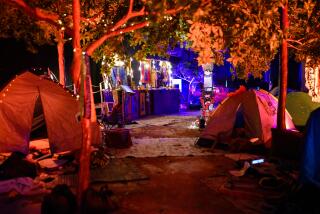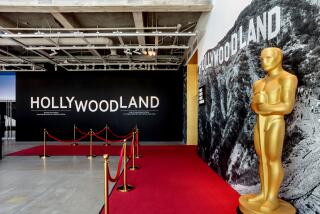Jerusalem Shows Low Tolerance for Museum
JERUSALEM — At first glance, few places on Earth seem like better candidates for a museum of tolerance than Israel, where Jews and Palestinians kill one another almost daily and mutual hatreds seem rooted in the stony soil.
The Israeli-Palestinian dispute is just one of the fault lines: secular Jews versus religious Jews, Israeli Arabs versus Israeli Jews.
In such an atmosphere, the formal launch Sunday by the Simon Wiesenthal Center of its plan to build a Museum of Tolerance, drawing on the center’s successful experience with its museum of the same name in Los Angeles, seemed almost like an impossible act.
“Promoting tolerance and human dignity is one of mankind’s unfinished challenges,” said Ehud Olmert, Jerusalem’s mayor, who pushed hard to bring the museum to his city.
The proposed museum has long generated controversy in Israeli newspapers and magazines. Yad Vashem, the renowned Holocaust museum here, lobbied behind the scenes to discourage the center from going ahead with its plans, which Yad Vashem saw as competition. Some Jerusalem natives bristled at the proposed museum’s design, by leading American architect Frank O. Gehry, which is unorthodox by the standards of this ancient city.
A number of groups that promote coexistence between Muslims and Jews asked why it was necessary to spend $150 million to build a museum to promote tolerance when there were so many programs underway to work on such issues.
And there was the economic reality: Since the armed violence began here 25 months ago, tourism has all but vanished, leading many people to question whether anyone will come to a museum in Jerusalem.
But none of that daunted the force behind the project, Rabbi Marvin Hier, the founder and dean of the Simon Wiesenthal Center and its Museum of Tolerance in Los Angeles.
The realities and repercussions of the Israeli-Palestinian conflict were “known to everyone involved in this project, and we thought maybe we should postpone it,” Hier said. “And then we thought: No, the most important thing for an American Jewish organization is to say we want to have a stake and we’re coming in bad times; we want to do it now.”
Hier said the Wiesenthal Center is committed to privately raising $150 million for the building and $50 million more to serve as an endowment -- huge amounts by Israeli standards and unimaginable by Palestinian ones. Hier, who is known as an indefatigable fund-raiser, will not say how much has already been raised or pledged. But he said his visit to Israel over the last few days brought in far more money than he had expected.
“We’re well on our way,” he said.
The project also relies on contributions from the city of Jerusalem and the Israeli government, which gave the museum the land -- a parcel in downtown Jerusalem adjacent to Independence Park. The three-acre campus on which the museum will be built will include a conference center, a theater, an education center, a library and interactive, state-of-the-art multimedia exhibits. It is slated to be completed by 2007.
In deference to Yad Vashem, the Wiesenthal Museum of Tolerance agreed to avoid dealing with the Holocaust and focus instead on the history of intolerance prior to the Holocaust and on the post-Holocaust period, particularly terrorism and anti-Semitism, Hier said.
“It would be superfluous in Jerusalem, just a few miles from Yad Vashem, to do that work,” he said.
Despite those public assurances, Yad Vashem officials remain skeptical that the new museum will be able to avoid the Holocaust, and they are clearly irritated that it has received backing from the government. In open letters published in local media, some members of the public also questioned whether it is possible to deal with tolerance and intolerance without a discussion of the Holocaust.
“Yad Vashem does not see the need to build an additional Holocaust museum in Jerusalem that will utilize state land and public funds,” said a statement released by the museum.
“The center was granted highly desirable land in the center of the city without a public bid. In addition, the Tolerance Museum, which is run by a private organization, will use public funds to maintain the center’s activities.”
The Wiesenthal museum will ask for taxpayer support once it is up and running.
Even harder is the touchy subject of how the museum will deal with Israeli-Palestinian relations. Hier says organizers will market the museum to Arabs as well as Israelis, and he points to the Los Angeles museum’s success in attracting people of all faiths and from such disparate groups as gang members and police officers.
However, veterans of Jerusalem’s charged atmosphere, who support the goal of mutual understanding between the two communities, see many difficulties ahead.
“Certainly, what Israel needs is tolerance,” said Larry Abramson, former head of the fine arts department at Bezalel Academy in Jerusalem. “Does it need a museum of tolerance? I’m not sure.
“Any true concept or forum for tolerance has to have equal representation on both sides, not just symbolic involvement.”
The museum’s organizers are vague about how they will involve the two sides, especially because relations have deteriorated to such a point that Palestinians and Israelis rarely work together on public projects.
Rabbi Abraham Cooper, the associate dean of the Simon Wiesenthal Center, who also came to Jerusalem, acknowledged the challenge. “We have to do our best to reach out across the board. We have a lot of challenges and obstacles to bridge.... But a lot of the questions will vanish the day we open our doors.”
More to Read
Sign up for Essential California
The most important California stories and recommendations in your inbox every morning.
You may occasionally receive promotional content from the Los Angeles Times.










